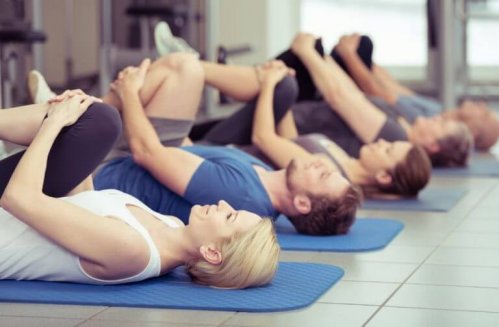Tips For Optimal Recovery After Exercise

After exercising, it’s normal to feel tired and exhausted. This is because your body made a big effort. However, it’s essential to know how to give yourself an optimal recovery after a tough workout. And so, follow these tips to help you.
This is a simple four-step process that will make the recovery after a workout quite easy. If you follow these tips, not only will you recover more efficiently, but you’ll also optimize the results and live a healthier life.
Four tips for optimal recovery after exercise
Here are the four tips to follow if you want to have optimal recovery after exercising. Thereby obtaining better results and living a healthier life.
1. Regain liquids
Most often, after exercising the body is dehydrated from sweating. Dehydration is directly related to the length and intensity of the exercise itself. Therefore, those who practice strenuous exercise must pay close attention to this factor.
The best way to regain liquids is to drink water or an isotonic beverage especially made for hydration. These types of beverages have a higher concentration of minerals and they allow for optimal recovery.
If you’re one of those people who doesn’t like to drink water, you can also drink fruit juices. Additionally, these juices are easy to make and have great benefits on overall health.

2. Stretching
The first thing you have to do after you’ve finished working out is to stretch your muscles. Keep in mind that the muscles just went through a strenuous effort, and therefore are tense. Thus, you need to make sure that you relax these muscles.
The safest way to do this is slowly and by making sure you focus on each muscle group individually. Especially those muscle groups that you just worked out.
Stretching is the best way to avoid those annoying cramps that often appear after a tough workout. This will also help to relax the muscles so that you can rest more easily. And so, remember that stretching is as important as warming up. Therefore, warming up and cooling down/stretching, is important for optimal recovery.
3. Resting
There’s a myth that the more you exercise you do, the better the results will be. However, this is a false myth because resting and recovery go hand in hand. Therefore, after working out, the body needs a good resting period.
Resting periods are vital parts of exercise in order to avoid tension and injuries in the muscles. Furthermore, if you don’t respect these periods, you won’t be able to improve your performance and enjoy optimal results.
Most exercise enthusiasts can’t seem to stay home and away from the gym for one day. But, it’s necessary to do this, to ensure optimal recovery.
4. Eating healthy food
As we have stated before, after exercising, your body is dehydrated. And so, the same thing happens with its nutrients since it needs them in order to withstand the effort of working out. Therefore it’s vital to eat foods rich in those nutrients in order to have an optimal recovery.

If we want to see the best results for our strenuous workout, we must give the body healthy foods. The best way to do this is to prioritize foods that are high in proteins, carbohydrates and make sure to ingest them in small doses.
To sum up, an optimal recovery needs hydration, stretching, enough rest, and healthy foods rich in proteins and carbohydrates. These four steps are simple and they will help you to see the results of your hard work.
After exercising, it’s normal to feel tired and exhausted. This is because your body made a big effort. However, it’s essential to know how to give yourself an optimal recovery after a tough workout. And so, follow these tips to help you.
This is a simple four-step process that will make the recovery after a workout quite easy. If you follow these tips, not only will you recover more efficiently, but you’ll also optimize the results and live a healthier life.
Four tips for optimal recovery after exercise
Here are the four tips to follow if you want to have optimal recovery after exercising. Thereby obtaining better results and living a healthier life.
1. Regain liquids
Most often, after exercising the body is dehydrated from sweating. Dehydration is directly related to the length and intensity of the exercise itself. Therefore, those who practice strenuous exercise must pay close attention to this factor.
The best way to regain liquids is to drink water or an isotonic beverage especially made for hydration. These types of beverages have a higher concentration of minerals and they allow for optimal recovery.
If you’re one of those people who doesn’t like to drink water, you can also drink fruit juices. Additionally, these juices are easy to make and have great benefits on overall health.

2. Stretching
The first thing you have to do after you’ve finished working out is to stretch your muscles. Keep in mind that the muscles just went through a strenuous effort, and therefore are tense. Thus, you need to make sure that you relax these muscles.
The safest way to do this is slowly and by making sure you focus on each muscle group individually. Especially those muscle groups that you just worked out.
Stretching is the best way to avoid those annoying cramps that often appear after a tough workout. This will also help to relax the muscles so that you can rest more easily. And so, remember that stretching is as important as warming up. Therefore, warming up and cooling down/stretching, is important for optimal recovery.
3. Resting
There’s a myth that the more you exercise you do, the better the results will be. However, this is a false myth because resting and recovery go hand in hand. Therefore, after working out, the body needs a good resting period.
Resting periods are vital parts of exercise in order to avoid tension and injuries in the muscles. Furthermore, if you don’t respect these periods, you won’t be able to improve your performance and enjoy optimal results.
Most exercise enthusiasts can’t seem to stay home and away from the gym for one day. But, it’s necessary to do this, to ensure optimal recovery.
4. Eating healthy food
As we have stated before, after exercising, your body is dehydrated. And so, the same thing happens with its nutrients since it needs them in order to withstand the effort of working out. Therefore it’s vital to eat foods rich in those nutrients in order to have an optimal recovery.

If we want to see the best results for our strenuous workout, we must give the body healthy foods. The best way to do this is to prioritize foods that are high in proteins, carbohydrates and make sure to ingest them in small doses.
To sum up, an optimal recovery needs hydration, stretching, enough rest, and healthy foods rich in proteins and carbohydrates. These four steps are simple and they will help you to see the results of your hard work.
All cited sources were thoroughly reviewed by our team to ensure their quality, reliability, currency, and validity. The bibliography of this article was considered reliable and of academic or scientific accuracy.
- Sánchez Benito, J. L. (2009). Efectos del ejercicio físico y una dieta saludable. Nutricion Clinica y Dietetica Hospitalaria, 29(1), 46–53. https://doi.org/10.1007/s10995-010-0571-1
- De la Reina, L., Martínez, V., Larkin, T. E., Junta, P. D., Defrantz, A. L., Evans, J., … Soto Morga, Antonio, J. (2003). Manual De Teoría Y Práctica Del Acondicionamiento Físico. Journal of Chemical Information and Modeling (Vol. 1996, p. 190). https://doi.org/10.1017/CBO9781107415324.004
- Pérez-Guisado, J. (2008). Rendimiento deportivo: glucógeno muscular y consumo proteico. Apunts. Medicina de l’Esport, 43(159), 142–152. https://doi.org/10.1007/s10672-009-9128-0
This text is provided for informational purposes only and does not replace consultation with a professional. If in doubt, consult your specialist.








